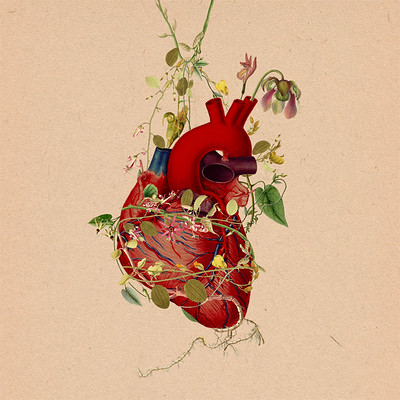
Somehow I always knew there was something about my dad’s heart. I’m not sure exactly what I knew, but I did know that he didn’t eat certain things, like eggs and bacon, and ate other things, like canned tuna and low-fat cheese and margarine. (It was the eighties.) He enrolled in a cholesterol study. Bottles of liquid meals appeared in the fridge, all autumn-colored: pale orange and green and brown.
I knew enough—or at least, worried enough—to read the sign at the waterpark where we’d climbed up to the top of the slide. I was small, and scared, but I told him he shouldn’t go down. It wasn’t good for people with heart problems. The heart seemed like a frightening thing, or at least unruly, ready to misbehave at any minute, something that constantly needed watching.
I feel less watchful now, but I do find myself drawn to any information about the heart. To the blue whale, its 400-pound heart as big as a Harley-Davidson, working to its edge. When it dives, it drops its heart rate from around 30 beats per minute to four.
I find how we talk about the heart fascinating, too. We are disheartened, we have lost heart, and it is hard to go on. The hearts of those we love are sweet. The ones we don’t, or who don’t love us, we call heartless. A different way of being without a heart. There are many creatures that never have a heart at all. The sea cucumbers, the jellies, the sea stars, the flatworms. And then there are the cephalopods, which have three. Two hearts do their work for the gills, the other sends blue blood swooshing to the organs. An octopus’s organ-focused heart even stops while it swims.
Hearts seem like small animals. They leap and flutter and sink. They can be heavy, they can be light. In Etruscan shrews, they can race along at 1,500 beats per minute. The lowest heart rate observed during a blue whale’s dive was two beats per minute.
Beat.
Count slowly to 30.
Beat.
If you think of someone who is all heart, do you imagine them as a four-chambered organ, the size of a fist? Does it surprise you that dogs’ hearts make up a bigger portion of their mass than almost all other animals?
And then there are trees. They have no wet engine, but the central column of wood that supports them is called the duramen, the heartwood. It will not falter if the surrounding layers of living tissue and the bark keep it safe. This heart is at the center of things, even though in most of us it sits slightly to the left. We can transplant hearts back into the body’s soil.
The heart of the matter, the heart of the problem. We get to the heart of it. We steal hearts and we take heart and we wear them on our sleeves. We open our hearts, we close them. Inside, the valves open and close, too, letting blood rush in and rush back out again. Although we have only one, we can lose them again and again. I sometimes imagine hearts scattered about the world like lost socks. Where do they all gather? Is there somewhere that they find each other, scattered in the gutter or clumped at the storm drain?
Wherever they go, they contain both movement and sound, a marker of time, if time is something that can be marked. The clock before there was a clock. Maybe hearts are time themselves. We don’t know how many heartbeats we have, but there is this one, and this one, and this one. Sometimes they murmur. Sometimes they pound.
It is better, though, if it is not always steady. Better to have a tripping rhythm that speeds up and slows down with every breath. A new type of pacemaker will even listen to the heart and follow its irregular lead, a willing dance partner from tango to foxtrot to TikTok mashup. The heart might march to the beat of its own drum, but when people sing together in groups, their breathing and their heartbeats start to synchronize.
It was my dad’s heart in the end. It stopped, and then it was restarted, but the rest of him never resurfaced alongside it, and then, eventually, it stopped too. It is easy to say it was his heart, because it feels like it’s all of our hearts, always up to something: aching and soaring, growing cold, starting to thaw. A zebrafish can repair its own heart, but to fix our hearts, sometimes we need each other. We need someone whose heart goes out to our lost ones and brings them skipping back home.
*
Image by Wednesday Morning via Flickr/Creative Commons license
I loved this, Cam.
Oh Cameron this is wonderful!!! And I just finished listening to the soul of an octopus. I think about your dad quite often. He was a very special person With a wonderful heart!
Oh this is so beautiful, heartfelt, heart-rendering, made my heart sigh deeply.
Thank you, Cameron!
What lovely, expansive thoughts beautifully woven together with heart. Thank you.
Dear hometown friend commenters are the best! Thank you all! xo
This is wonderful! The end.